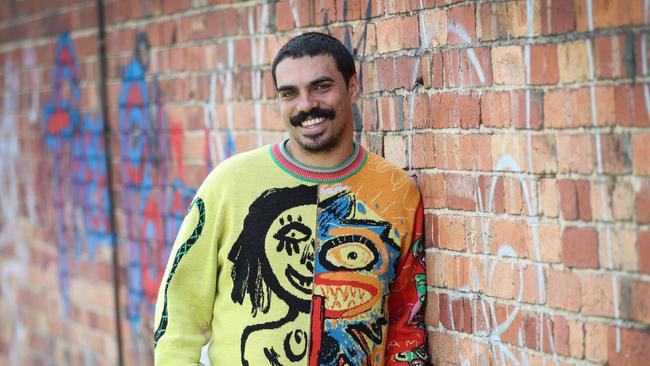
When Tony Armstrong was asked to write a memoir, his response to his agent was unexpected: “Do you reckon anyone would let us write a kid’s book?”
After charming audiences on ABC News Breakfast and winning the Logie for Most Popular New Talent in 2022, the former AFL footballer was riding a wave of new opportunities. When he was named Most Popular Presenter the following year, the media beehive buzzed again – including another request to write a memoir.
But Armstrong, 34, had no interest in putting another football story on the shelves.
“I was asked at 32 or something,” he laughs.
“And I was like, I’ve got to do something first.”
Instead, he channelled his creativity into a children’s book, George the Wizard, set for release in October.
“It’s about my reading level,” he jokes, adding that the genre was a less daunting toe in the water of the literature world.
“I love being in the world of the fantastic and being a bit silly,” he adds. “Kids’ books just throw the rules even further out the window. It’s just feel and emotion and I was drawn to that – the only thing holding you up is you.”
Armstrong admits he didn’t have a story in mind when he first suggested the book to publisher Hachette. Instead, he was preparing to pitch an idea “caught with my pants down and the tide out”.
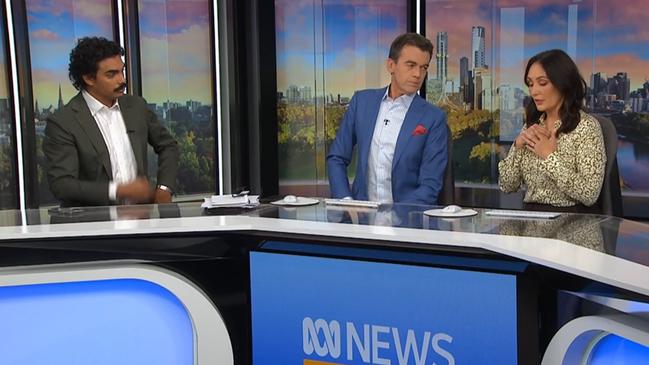
Relying on the creativity he honed growing up as an only child in rural NSW – daydreaming and always up for a chat – he quickly dreamt up George, a quirky wizard who lives alone on a mountain and learns to embrace his powers and himself.
Co-created with illustrator Emma Sjaan Beukers, whose work draws from her Ngemba/Ngiyampaa, Dutch and Irish heritage, the book is about being true to who you are, even when it feels scary to show it to the world.
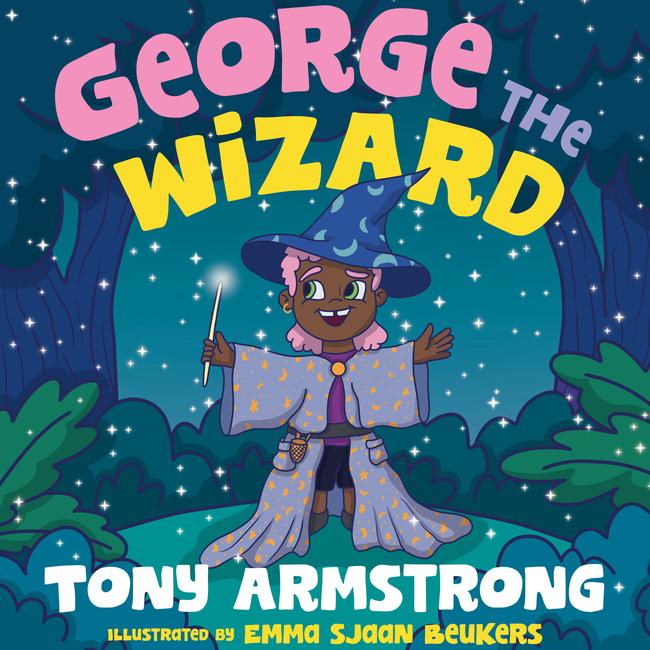
“I didn’t want to write another footy story or necessarily an Indigenous-led story. Mainly because I think that’s what people expected,” says Armstrong, a proud Gamilaroi man.
“I like zagging when I’m expected to zig.”
This approach is emblematic of his career – often breaking new ground, including becoming the first Indigenous AFL commentator on commercial radio in 2019.
Since then, his career has accelerated.
He joined the ABC and quickly became a fan favourite presenting sport on ABC News Breakfast, leading to a flurry of other TV appearances and a pair of Logies.
Despite his success, Armstrong has been careful about his career choices.
“I try to do things that are in line with where I want to go, not taking me away from it,” he says. “It’s taking a longer-term view and not jumping at the next thing that comes around the corner.”
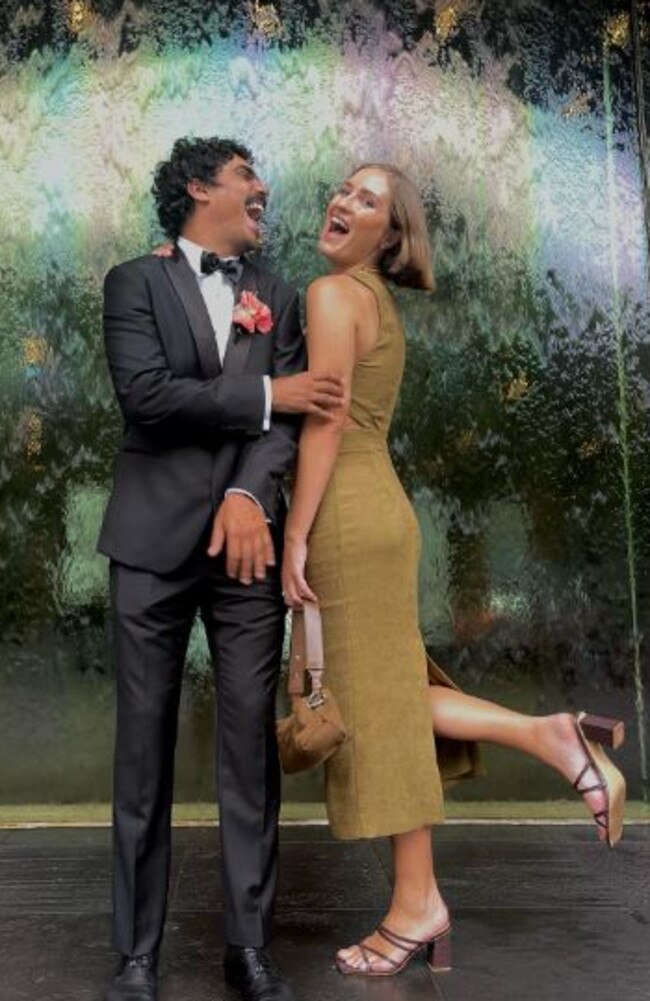
Speaking from his home in Melbourne, Armstrong is catching his breath after a busy period, including appearing at the Logies in July, alongside girlfriend Rona Glynn-McDonald, where he was nominated for a Gold Logie.
“I’m trying to recuperate, get healthy – just get my energy and balance back, I guess, which is taking a bit longer than I thought it would,” he says.
“Only now do I feel comfortable enough to have a break, you know? Even six months ago I was stressed about having established myself.
“When you’re starting out in something you’re so keen to establish yourself – and I’ve only just started to feel like I belong in the industry – so saying no is really hard,” he continues. “But I’ve got a great team around me. I go to them for advice daily.”
The Gold Logie was won by veteran presenter Larry Emdur, but Armstrong’s nomination received widespread coverage – partly because he would have been the first Indigenous Australian to win it.
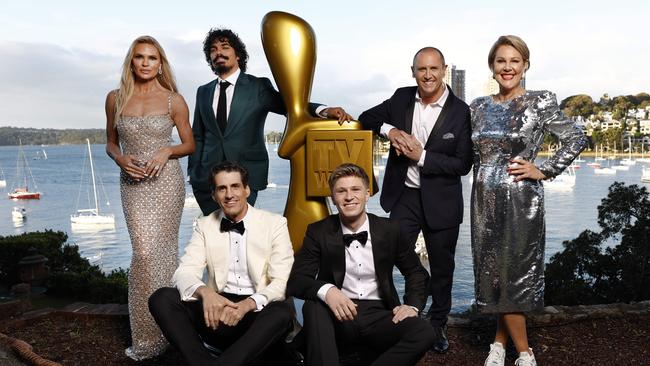
As a prominent Indigenous figure in mainstream media, Armstrong is learning to navigate the pressure that comes with his achievements, acknowledging that advocacy for anyone who belongs to a marginalised group is rarely a choice.
“It’s just got to be done,” he says of his advocacy work.
“It’s a privilege, but it’s also another layer that a lot of Australia doesn’t understand. And not just for me – for so many Indigenous people, so many women, so many people who haven’t had a good run of it.”
Armstrong hasn’t shied away from discussing difficult issues publicly, but is candid about the weight of his platform, which is larger now in television than it was during his AFL career.
“When I was playing football, I was lucky. I was at the Adelaide Crows and there were some great senior players there, Indigenous players, and then I got to the Swans, and we had some great Indigenous players there as well, so most of the advocacy fell on their shoulders,” he says.
“But now, I am someone who has a platform to advocate – like it or lump it – and that’s something that I struggle with.
“I try to be actively engaged, but there are so many other people more knowledgeable than me. I’m just afforded the platform. I am aware that sometimes my voice can carry and have some cut-through, so I just try to do my best.”
Despite the challenges, Armstrong finds value in connecting with young people who look up to him.
“I probably don’t think about it enough, and if I did, I might start going a bit weird,” he smiles. “But those moments every now and then when a kid will be like, ‘Oh my God, hello!’ or ‘You’re awesome’ … that really puts a smile on my face.”
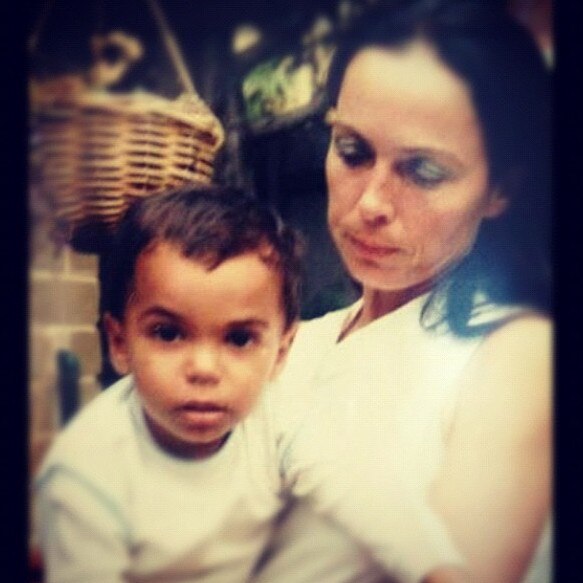
Armstrong beams, imagining the impact of his book series: parents making silly voices to their children and a flurry of proud, eccentric wizards at 2025 Book Week.
He is preparing to embark on a book tour of 20 schools, reading to 3000 students and visiting two children’s hospitals.
It includes the school in Albury where his mother Margaret works as a primary school teacher. Armstrong received a barrage of letters from determined year 3 students, one of which read: “We’re just going to hold your mum hostage until you come.”
“I was like, oh my God, these year 3s are awesome,” Armstrong laughs. “I’ve got to work on some voices. I just hope they like it and want to read it again and see Emma’s amazing artwork and illustrations,” he continues.
“And then, without being preachy, it’d be nice if maybe they saw a bit of themself in George, perhaps. And they’re like: ‘Yeah, I might be a little bit kooky, but so what?’
“It really does resonate with me as well – being me is the best thing I can do for myself and for my friends and my family.”
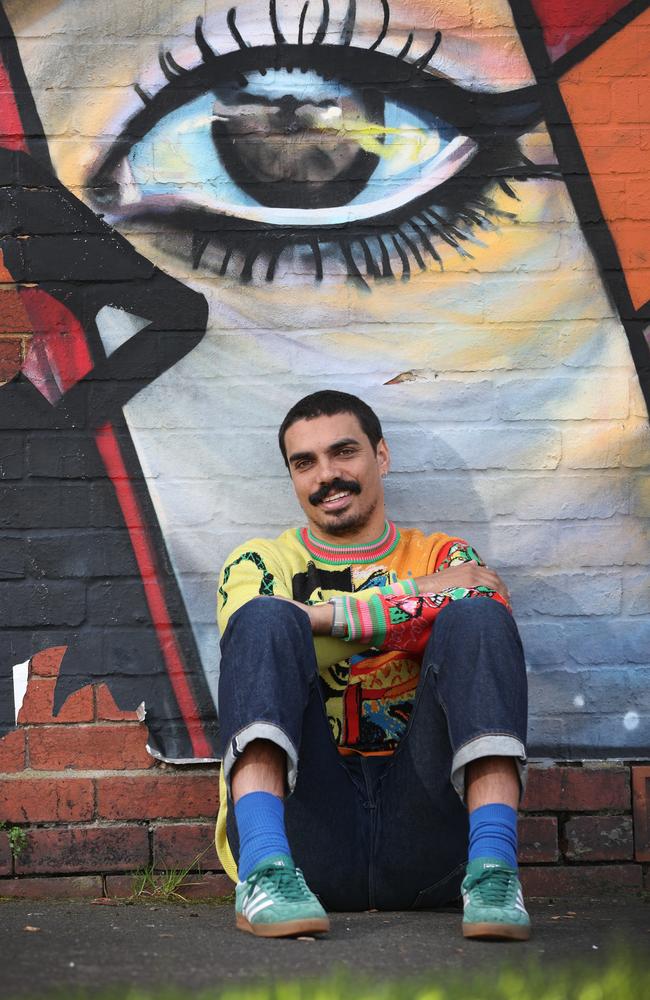
Shortly after the successful pitch, Armstrong wrote George the Wizard in a stream of consciousness on a short flight from Sydney to Melbourne.
“It was just doof, doof, doof,” he recalls. But as the book began to take shape, Armstrong realised it was more personal than he intended.
“Jeanmarie (Morosin) from Hachette, was like: ‘So that’s you, right?’ And I’m like, ‘Oh, I guess it could be,’” Armstrong recalls, the penny dropping about his not-quite-a-memoir.
“It’s probably a story that I’ve had in me for a long time, and I didn’t realise it as I was writing it … I’ve probably just been carrying it around my whole life.”
Armstrong grew up in Albury, rural NSW, as the only child of a single mother. He is Gamilaroi through his father, who wasn’t part of their lives.
His mother worked hard to send him to well-known boarding school, Assumption College, in Melbourne, and helped at an Aboriginal dance theatre in Redfern when he was young, where he was exposed to culture and creativity each weekend.
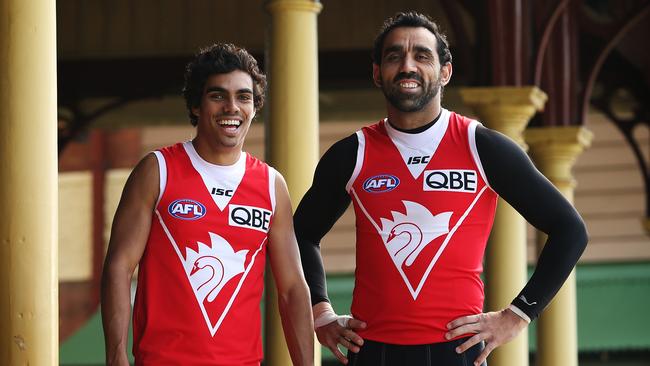
Armstrong loved team sports and was footy-obsessed, idolising players like Adam Goodes, Michael O’Loughlin and Stuart Maxfield from the Sydney Swans.
Reflecting on his upbringing now, he realises how fortunate he was and how those influences shaped his identity.
“I just got so good at socialising that it didn’t really worry me (that I was different),” Armstrong says.
“Obviously pretty much every room that I walk into, I’m generally the only black person in the room, just every day. And when you’re a kid and you’re not really strong in yourself yet, that can be a bit funny.
“But in terms of connection to friends, I’ve always been really lucky – and I’ve always had some good adult role models around as well who have really helped me. So (I wasn’t) necessarily ‘othered’ or anything, but I definitely knew that what was happening wasn’t normal, whatever normal is.”
He rattles off the names of a few local farmers from the small community.
“They sort of saw that mum was a single mum and they got around us, and you don’t realise what’s happening when you’re a kid, but upon reflection, they were just so brilliant.”
Armstrong gained further resilience from his football career, which included being drafted to the Crows the day after he graduated from high school, and later, a stint at the Swans alongside his idols.
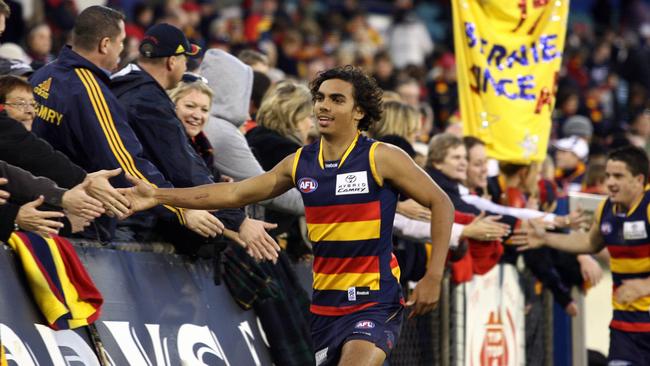
He played 35 games across six seasons for Adelaide, Sydney and Collingwood, but his career ended abruptly in 2015 when he was delisted from Collingwood, leaving him lost. The sport had been his obsession, his singular focus since he was a teenager.
“I was a very immature 18-year-old when I left boarding school and went to Adelaide,” he says. “You’re held to the exact same standards immediately as a 32-year-old elite professional, and I was just so far off it, I didn’t know what it took. But all that stuff that I went through with footy and not getting what I wanted is perfect for what I do now.”
He credits the experience for his willingness now to try new things, no matter how strange or unexpected they may be, because he learned that life continues after disappointment.
Armstrong’s pivot to broadcasting began by chance after a meeting with Brisbane Lions legend Chris Johnson, who directed him to the National Indigenous Radio Service.
That weekend, he found himself on air for the Indigenous broadcast, and his career in media quickly took off.
“It’s been a bit of a rocket ship to be honest,” Armstrong says.
“It’s just working hard and being pretty ruthless on your own standards of output.”
He reflects on the early moments – watching AFL broadcasts on mute in the living room of his share house so he could practise commentating and thinking out loud, no matter how it looked to his house mates.
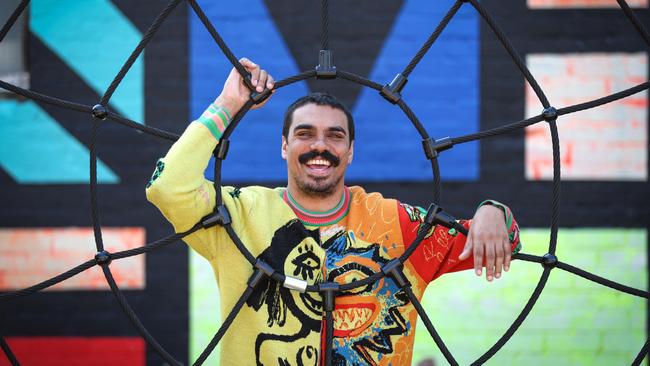
“Oh my God, if you had have seen it,” he laughs.
“That’s so funny. It’s just the things you do, right? And no one thinks about that when they see the finished product. They just see you doing what you’re doing, and they think that it’s just been a cakewalk.
“You’ve got to just bust your ass,” he continues.
“Everyone who’s done anything worth anything has worked their butt off … and if you’ve worked your butt off, you get luckier, because you’re in situations more, and because you’ve worked your butt off, you’re ready when the opportunity comes.”
As Armstrong continues to navigate his evolving career, he is going back to his roots and focusing his efforts on doing what will make him proud.
“When I was younger, I probably worried about legacy a lot; when you’re working out your identity and your ego,” he reflects.
“But as I get older – I’ve got some bloody grey hairs, I noticed them when I shaved my head yesterday – the legacy piece isn’t necessarily what I think about. It’s more stuff that I’d be proud of.
“If I was to look at what I do, as a kid would I be proud of that? I don’t always get it right, but it’s what I try to do.”
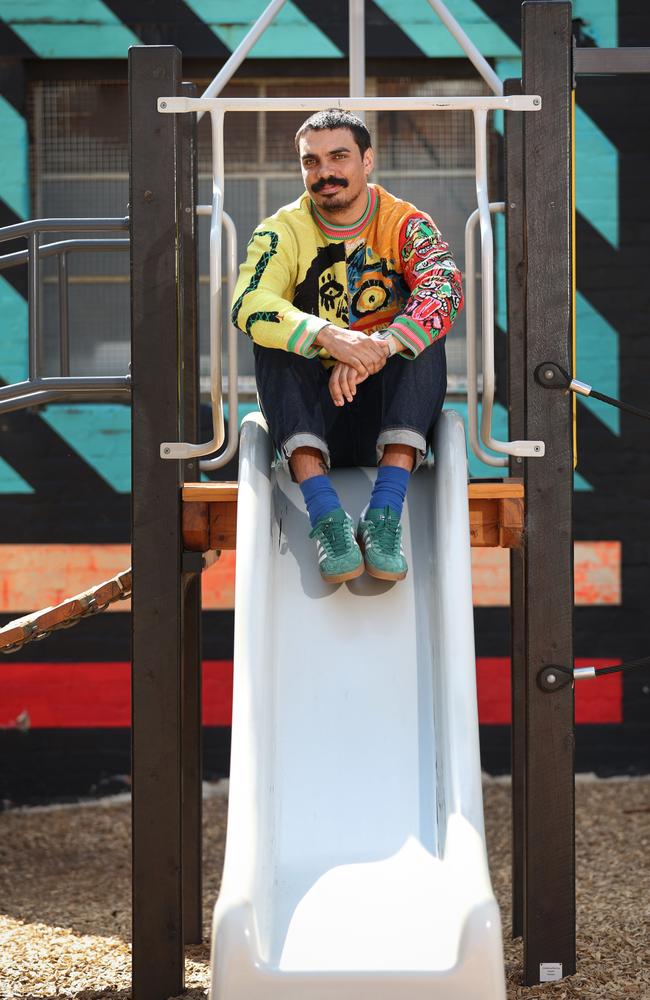
When asked how his younger self would react to George the Wizard, Armstrong pauses. “He’d go, ‘Who wrote it – really?’” he laughs. “No, he’d be stoked. I’m so proud of it, and I think a young me would be very proud of what Emma and I have done.”
Now firmly into a creative headspace, Armstrong plans to explore more scripted work while continuing the book series.
“I love sports so much, so I’ll be happy doing (ABC News Breakfast) for as long as it’s right,” he says.
“Outside the world of kids’ books … it’s probably getting more into scripted stuff. I really like writing and performing. I was really creative (as a kid) and then I just didn’t pay any attention to it because I was so sport focused. And they can co-exist, but I just didn’t feed the wolf.”
As his career takes another unexpected turn, Armstrong – like George the Wizard – is reminded that the most wonderful things come when you embrace your uniqueness and throw in your best zag when everyone expects a zig.
The only thing holding you up is you.

Add your comment to this story
To join the conversation, please log in. Don't have an account? Register
Join the conversation, you are commenting as Logout
‘Half my friends have an eating disorder from TikTok – the other half are lying’
Parents have long been warned to keep their children off social media – but not everyone agrees.
Maid of honour’s slip-up moments before walking the aisle
What started as a simple dance request became an extraordinary love story spanning two countries.